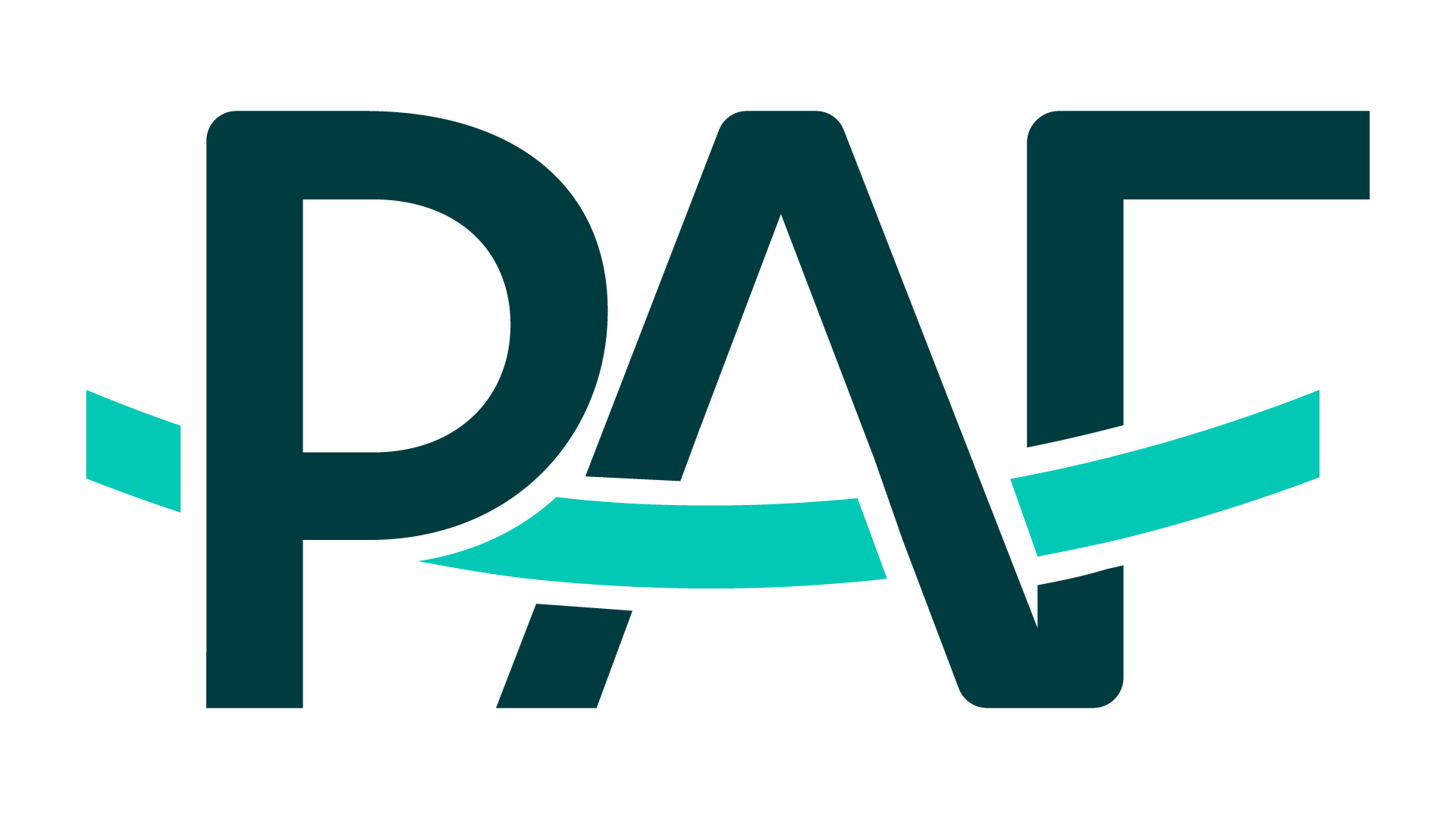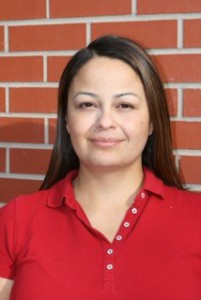2024 Recipients
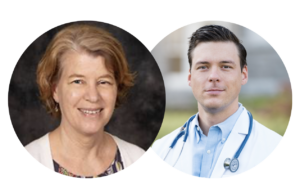 James Madison University PA Student Society (project led by Jordan André, PA-S, and Sharon Maiewski, PA-C)
James Madison University PA Student Society (project led by Jordan André, PA-S, and Sharon Maiewski, PA-C)
Grant Amount: $10,000
Project Name: Healthcare for the Homeless Suitcase Clinic – Improving Access to Health and Wellness
Project Description: The purpose of this grant project and the health problems this project seeks to address include improving access to routine medical, dental, vision, and behavioral healthcare for shelter residents and improving their access to prevention and wellness resources. In the homeless community, medical concerns are often untreated due to a lack of trust, proximity, health insurance, transportation, and resources needed to navigate the healthcare system. By taking compassionate and trauma-informed medical care directly to homeless shelters, the Suitcase Clinic helps patients circumvent these barriers so their medical needs can be more easily addressed. Funding will help provide for clinic supplies, a trauma-informed care space, exam equipment, and vision and dental care. In addition, having a permanent shelter site with greater capacity will enlarge the clinic’s patient panel, improve continuity of care, and allow more opportunities for promoting wellness among the community.
2023 Recipients
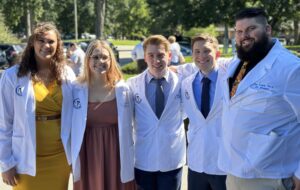 Lake Erie College PA Program (project led by Madison Sullivan, PA-S – Director of Events/Lead Coordinator; Daniel Bixel, PA-S – Co-Director; Brock Schafer, PA-S; Clay Cooper, PA-S; Mallory Knill, PA-S)
Lake Erie College PA Program (project led by Madison Sullivan, PA-S – Director of Events/Lead Coordinator; Daniel Bixel, PA-S – Co-Director; Brock Schafer, PA-S; Clay Cooper, PA-S; Mallory Knill, PA-S)
Grant Amount: $5,000
Project Name: “Fall Into Health and Wellness” Fair
Project Description: Lake Erie College will host the 2nd Annual “Fall into Health and Wellness” health fair in 2024. “Fall into Health” is a community health fair that was completely established by students of the PA graduate program. The goals of the event are to promote health and wellness activities across Lake County, Ohio, educate community members on the role of a PA, and build stronger connections with Painesville and the surrounding area. To address the various social determinants of health in Lake County, vendors will provide vision screening, dental care, physical exams, vital signs, women’s health, STD testing and treatment, HIV testing/treatment, vaccinations, homelessness services, community services and more.
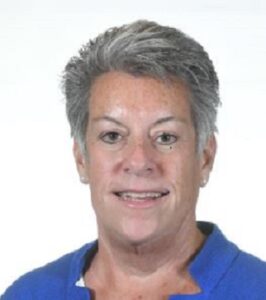 University of Saint Joseph (project led by Tricia Marriott, PA-C, MPAS, MJ Health Law, CHC, DFAAPA)
University of Saint Joseph (project led by Tricia Marriott, PA-C, MPAS, MJ Health Law, CHC, DFAAPA)
Grant Amount: $4,400
Project Name: PAs STOP THE BLEED®
Project Description: Grant funds will be used to purchase training equipment for STOP THE BLEED® training, which aims to prepare people to recognize and identify life threatening bleeding and provide initial response to stop uncontrolled bleeding. The USJ PA Program has trained the upper class students as certified instructors who are ready to provide training in the community. The anticipated outcome is increased community safety and response capabilities to accidents and unintentional injuries, thus improving the health of the community. PA students will become proficient in providing medical education and safety training to the community, serving as a force multiplier for the communities they will eventually serve.
2022 Recipients
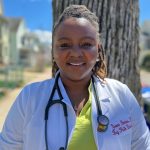 Bay Path University (project led by Yvonne Thomas, PA-S, and Marie Meckel, MPH, PA-C)
Bay Path University (project led by Yvonne Thomas, PA-S, and Marie Meckel, MPH, PA-C)
Grant Amount: $5,300
Project Name: Community Pop Up Health Fair
Project Description: The principal learning objective of this project is meeting the community where they are to address social determinants of health within the local underserved community, specifically regarding obesity, mental health, and substance abuse in order to promote overall health and wellness. As current Baypath PA students begin their transition into the workforce, it is paramount to understand the diverse patient population of the community and how to best care for them. This pop-up health fair will help foster more culturally competent and aware healthcare professionals. Additionally, it will strengthen patient education, knowledge of disease processes, and treatment options, as students will be trained to educate attendees about their conditions.
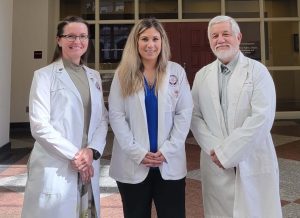 Florida State University Research Foundation (project led by Allison Justice, PA-C, Christina Hofman, PA-S, Stephen Lowmiller, PA-S, Stephen Quintero, MD, and Vivian Tanos, MD-S)
Florida State University Research Foundation (project led by Allison Justice, PA-C, Christina Hofman, PA-S, Stephen Lowmiller, PA-S, Stephen Quintero, MD, and Vivian Tanos, MD-S)
Grant Amount: $1,700
Project Name: FSU College of Medicine HOME (Homeless Outreach Medicine and Education) Program
Project Description: The Florida State University PA Program is starting a street medicine initiative to bridge the gap in accessibility to healthcare for homeless persons in Leon County. Students and faculty will make rounds on the street with a focus on building relationships, community health, and health screenings. The Bond Community Health Center has agreed to serve as a partner to provide primary care, laboratory work, and medications.
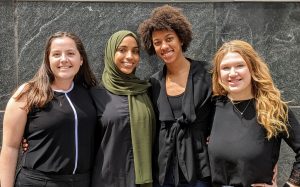 The George Washington University Healing Clinic (project led by Fatima Elgarguri, PA-S (Lead Coordinator), Abigail King, PA-S, Alana Herran, PA-S, and Laura Tiffany, PA-S)
The George Washington University Healing Clinic (project led by Fatima Elgarguri, PA-S (Lead Coordinator), Abigail King, PA-S, Alana Herran, PA-S, and Laura Tiffany, PA-S)
Grant Amount: $10,000
Project Name: Healing Clinic Pap Smear Project
Project Description: The Pap Smear Project aims to enhance adherence to cervical cancer screening guidelines among uninsured women at Bridge to Care, a student-run free clinic in Prince George’s County, Maryland. The underlying goal is to address disparities in cervical cancer screening and mortality for uninsured women. Project leaders aim to achieve this goal by standardizing and improving screening procedures as well as providing clinician and patient education. The project is run entirely by four first-year PA students in the George Washington University joint-degree (PA/MPH) program.
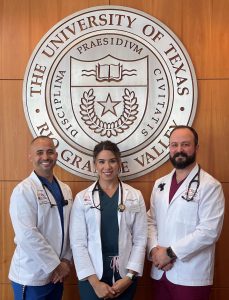 The University of Texas Rio Grande Valley (project led by Justin Wendel, PA-S, Marco Martinez, PA-S, Carolina Corkill, PA-S, Paul Yeh, PhD, and Frank Ambriz, PA-C)
The University of Texas Rio Grande Valley (project led by Justin Wendel, PA-S, Marco Martinez, PA-S, Carolina Corkill, PA-S, Paul Yeh, PhD, and Frank Ambriz, PA-C)
Grant Amount: $3,000
Project Name: Patient Education and Early Screening for Colorectal Cancer in the LRGV
Project Description: The goal of the “Patient Education and Early Screening for Colorectal Cancer in the LRGV” project is to provide PA and PA student driven patient awareness and education on the topic of colorectal cancer (CRC), and the screening of the population of rural communities surrounding the Lower Rio Grande Valley (LRGV) metropolitan areas. The demographic of the LRGV is well known for exhibiting many of the associated risk factors for CRC and have a higher than national average rate of incidence, mortality, and lower compliance with screening measures due to both health related and socioeconomic related disparities. Many new guidelines have been created for the screening of this disease, and we aim to educate these communities on the availability of free screening through existing insurances, and to provide free screening for the portion of the population that does not qualify for screening either through their insurance or lack thereof.
2021 Recipients
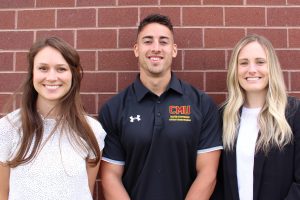 Colorado Mesa University PA Program (project led by Danielle Pelletier, PA-S, Hannah Reger, PA-S, and Izak Huard, PA-S)
Colorado Mesa University PA Program (project led by Danielle Pelletier, PA-S, Hannah Reger, PA-S, and Izak Huard, PA-S)
Grant Amount: $2,700
Project Name: Healthy Cooking Project
Project Description: There is a clear need for dietary intervention in Mesa County, Colorado, for patients with chronic illnesses, such as diabetes, hypertension, and childhood obesity. Teaching patients about healthy eating habits to address their chronic illnesses can be time consuming and is often neglected by healthcare providers. In Mesa County, there are limited opportunities for the public to learn how to shop, cook, and eat healthily on a budget. In partnership with the Western Colorado Community College (WCCC) Culinary Program, Colorado Mesa University PA Program has developed an initiative to provide free monthly cooking classes for the community. Each class is overseen by a Colorado Mesa University PA student, who will educate the participants about dietary approaches to managing specific diseases or nutritional needs, along with methods for healthy meal shopping and cooking. Classes will include instruction from the culinary students from WCCC on food preparation and kitchen safety. The success of the program will be determined by pre- and post-class surveys. The long-term goal of this program is to provide an adjunctive service to primary care providers managing chronic illnesses and to become an ongoing nutrition educational resource for those in the community with chronic disease.
 Food Strong (project led by Jereme Mellenthin, PA-C, and Sara Continenza)
Food Strong (project led by Jereme Mellenthin, PA-C, and Sara Continenza)
Grant Amount: $10,000
Project Name: The Care Strong Project
Project Description: The Care Strong Project is a partnership between the Case Western Reserve University (CWRU) PA Program, University Hospitals (UH) Department of Family Medicine, and Ohio Northern PharmD Program (ONU), and Food Strong, which serves as the host nonprofit organization. Food Strong is a 501(c)(3) organization serving Northeast Ohio whose mission is to empower and strengthen communities through fresh, local foods. A heavy emphasis is placed on community engagement and collaboration to promote successful program implementation and sustainability. The Care Strong Project is designed to educate clients on the direct connection between food and health. Through this innovative program, PA students receive training on providing a variety of health screenings, education, and linkage to vital wellness resources. Three events are held per month at strategic locations in Northeast Ohio, all of which are considered “food deserts,” or communities with low access to fresh food retail options. The project team disseminates coupons to spend on fresh foods, PPE and hygiene supplies, and other wellness-related giveaways for participation in the program. Project leaders collect program data, distribute surveys, and implement qualitative analyses to evaluate program success. Focus is given to ensuring PA students gain valuable interdisciplinary community outreach experience, recognizing the importance of service to the community and meaningful client engagement in preparing students for success in their professional careers.
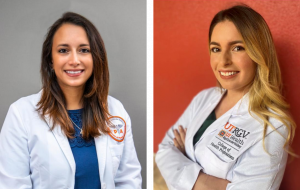 The University of Texas Rio Grande Valley (project led by Christina Granado Gonzales, MPAS, PA-C, and Evelyn Jimenez, MPH, PA-S)
The University of Texas Rio Grande Valley (project led by Christina Granado Gonzales, MPAS, PA-C, and Evelyn Jimenez, MPH, PA-S)
Grant Amount: $8,800
Project Name: Bridging the Digital Literacy Gap: Physician Assistant Students Teach Technology
Project Description: The Physician Assistant Students Teach Technology (PASTT) project is designed to bridge the digital literacy gap encountered in vulnerable populations. Over the past year, amidst the COVID-19 pandemic, there has been an unprecedented shift from in-person care to telehealth in nearly every form of healthcare. This rapid transition has exacerbated healthcare disparities among the most vulnerable populations (low-income, uninsured, minority, elderly, etc.) due to lack of technology access and knowledge. The project team seeks to address this issue with a PA-led educational intervention to augment familiarity with and competency in the usage of a telemedicine platform to improve overall patient health outcomes in a low-income, primary care clinical setting. Through the tangible use of intentional education directed toward increasing patients’ digital literacy as well as the provision of self-care medical kits to monitor non-communicable disease status, the project is designed to improve the local population’s comfort level with technology and telehealth encounters, which will ultimately improve overall patient care access, quality, and outcomes.
2020 Recipients
General Projects
Lake County Free Clinic (project led by Cindy Lord, MHS, PA-C – Case Western
Reserve University; Martin Hiller, MS, PCMH-CCE – Executive Director, Lake County Free Clinic)
 Grant Amount: $10,000
Grant Amount: $10,000
Project Name: Expanding Access to Care in Northeast Ohio
Project Description: Expanding Access to Care in Northeast Ohio is a partnership between the Case Western Reserve University (CWRU) PA Program and Lake County Free Clinic, the only free clinic providing medical and dental care to uninsured and underinsured adults in a 3.5-county radius in northeast Ohio. This project will provide 18 evening clinics at Lake County Free Clinic that will be staffed by PA proctors and PA students in the CWRU PA program. Each clinic is expected to provide 12 treatment visits for northeast Ohioans unable to access needed healthcare. Over the course of the first year, project leaders expect to provide 225 treatment visits to individuals, many of whom are facing chronic conditions like diabetes or high blood pressure, and are at high risk for further co-morbidities, especially in the face of the current public health crisis. PA students will be responsible for patient history, physical exams and medical documentation, and are key to the success of the project, as they will create materials for and provide diagnosis and lifestyle education to patients who may be facing a difficult new diagnosis or looking to improve or maintain their health condition.
 Denver Health (project led by Jessica Wallace, MPH, MSHS, PA-C)
Denver Health (project led by Jessica Wallace, MPH, MSHS, PA-C)
Grant Amount: $9,880
Project Name: Denver Health – Teaching Kitchens to Create a “Healthy World”
Project Description: Denver Health is a network of nine community health centers serving the underserved in Denver, CO. This project is designed to pilot culinary education (via the national Teaching Kitchen Collaborative, using the “Kitchen in a Box” model) integrated into Denver Health’s “Healthy World” programs for patients and families who suffer from excess weight and its related chronic diseases. These programs have been in existence at Denver Health since 2014, are PA-led, and integrate needed education into clinical care to address the root causes of many chronic diseases. The Teaching Kitchens will meet a direct patient need to help translate increased knowledge and motivation for healthier eating into action at home and in the community. This pilot will be rigorously evaluated to ensure reach, patient satisfaction, and effectiveness – including increased knowledge, behavior change, and health outcomes such as BMI. Proven methods will be used to implement a sustainability plan and ensure that this pilot can continue beyond the pilot grant funding.
Mental Health Project
New York Institute of Technology (project led by Sara Winter, PA-C, MSPA, and Shinu Kuriakose, PA-C, DHSc)
 Grant Amount: $9,855
Grant Amount: $9,855
Project Name: Frontline Preparedness for Mental Health Crises
Project Description: “Frontline Preparedness for Mental Health Crises” will directly enhance PA student and practitioner ability to recognize, screen, educate and refer patients with mental health disorders and crisis. This project is intended to train and engage healthcare students, practitioners and first responders in the community. Two practicing PAs will take the certification for training course in Mental Health First Aid and provide training and seminars to healthcare students, practitioners and first responders in the community. By preparing those on the front lines of mental health crisis, patients will directly benefit from quality care. This project aims to decrease stigma amongst providers and equip them to better interact with, treat, and refer those in need. This project is intended to have community impact through awareness and engagement to aid those in need of mental healthcare.
2018 Recipients
General Projects
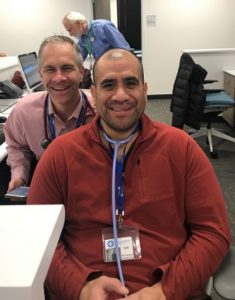 Maliheh Free Clinic (project led by Uai Panisi, PA-C, Jeanie Ashby, and Dave Miner, MD)
Maliheh Free Clinic (project led by Uai Panisi, PA-C, Jeanie Ashby, and Dave Miner, MD)
Grant Amount: $2,740
Project Name: Healthy Families Support Program
Project Description: The Maliheh Free Clinic seeks to improve quality of life in the Greater Salt Lake Area by providing free medical services for uninsured and low-income individuals and families to help reverse the cycle of poverty and suffering created by poor health. Quality care creates healthier individuals, and these individuals create a stronger and safer community. The clinic offers a wide range of medical services to those most in need, with a focus on preventive care. Additional services offered to patients include: physician and nursing evaluations, laboratory studies, x-ray and imaging, sub-specialty consultation, assistance with obtaining medication, provision of diabetic monitoring equipment and supplies, education, counseling and physical therapy. The clinic has over 50 PA volunteers dedicated to the mission and work of the clinic who are instrumental to the ongoing success of the Healthy Families Support Program. Understanding the need to educate and train the next generation of medical providers, the clinic has established long-running partnerships with the University of Utah and Roseman University PA Programs. This collaboration helps those most in need in the community, while educating the next generation of healthcare professionals.
Rush University (project led by Erin Paolini, PA-S, Jessica Vlaming, PA-C, and Tamara Dukich, PA-S)
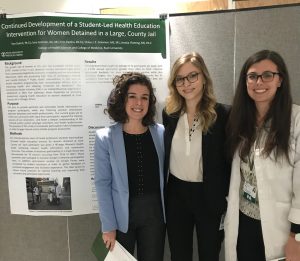 Grant Amount: $5,230
Grant Amount: $5,230
Project Name: The Correctional Health Initiative (CHI)
Project Description: Currently, there are more women behind bars than ever before in U.S. history. This change in population has introduced unique and significant barriers to correctional systems, as they have historically been dominated by men. One growing challenge is pregnant detainees, a vulnerable, overlooked population that reports high rates of unplanned pregnancy, substance use disorders, and mental illness. Inadequate prenatal care is associated with poor pregnancy outcomes, and because detained women face low health literacy and significant barriers in accessing health care, their pregnancies are often high-risk. The Correctional Health Initiative (CHI) is an interprofessional, student-run organization at Rush University Medical Center designed to address health disparities by providing education to women detained at Cook County Jail (CCJ) in Chicago, IL. This program empowers student volunteers to deliver weekly health education sessions at CCJ, and aims to improve health literacy and promote positive relationships between detainees and healthcare professionals. The next challenge is to specifically address the complex and unique needs of women who are pregnant and detained by creating a new reproductive health curriculum and community resource guide.
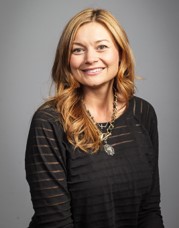 Touro University Nevada (project led by Amie Duford, PA-C)
Touro University Nevada (project led by Amie Duford, PA-C)
Grant Amount: $2,030
Project Name: Patient Education Using Information Screens
Project Description: This project focuses on health literacy. The PA program at Touro University Nevada has been providing services to the homeless population in southern Nevada for many years. One challenge is the population’s low general and health literacy and lack of basic knowledge about disease risk factors and preventive strategies. The project team proposes to test whether displaying health messages on TV screens strategically placed in patient waiting areas is an effective approach to raising health awareness among homeless persons. The benefit of this project is two-fold. First, patients will be exposed to information on a variety of health topics. Second, PA students will be responsible for creating educational messages and thus improving their communication skills. The goal is to develop concise, impactful and memorable messages that are tailored toward the specific needs of homeless persons. The objectives of this project are to (1) use information screens to educate patients on a variety of health topics; (2) engage PA students in designing educational materials using principles of effective communication; and (3) assess the impact of the message content and delivery mode on patients. Data will be gathered using student and patient surveys and patient semi-structured interviews. The outcomes will include students’ perceived ability to design and communicate health information and patients’ evaluation of message content and delivery mode.
Yale New Haven Hospital (project led by Elaine Bonoan, PA-C, and Karen Marlett, PA-C)
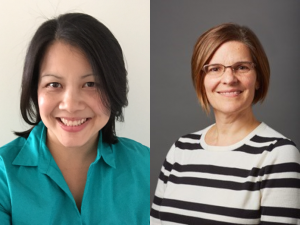 Grant Amount: $10,000
Grant Amount: $10,000
Project Name: Post-ICU Outreach Program – MICU at YNHH
Project Description: The PAs of the Medical Intensive Care Unit (MICU) at Yale New Haven Hospital are developing a post-ICU outreach program that focuses on Post Intensive Care Syndrome (PICS). PICS refers to physical (neuro-muscular), cognitive, or psychological problems that remain after a critical illness/ICU stay. It also pertains to mental health, as some patients can suffer from anxiety, depression, and post-traumatic stress. The PA-led liaison team will identify patients with or at high risk for PICS and implement consult service to follow patients after the ICU stay and help to coordinate their care, as well as educate and bring awareness to hospital staff members and incorporate PA students in clinical evaluations of patients. The team will help with recovery post-ICU and also improve patient/family experience and satisfaction. The grant funds will be used for patient diaries to journal their experiences as well educational materials and two devices to facilitate patient communication and project progress.
Mental Health Projects
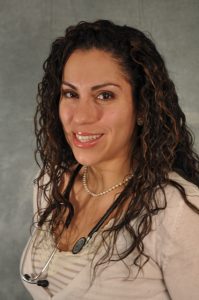
Drexel University (project led by Daisy Rivera, PA-C)
Grant Amount: $3,703
Project Name: Trauma-Focused Training, Consultation, and Implementation of Routinized ACEs Screening to Improve Resiliency of Families Affected by HIV
Project Description: This program seeks to expand the PA-led primary care behavioral health model by incorporating screening for Adverse Childhood Events (ACEs) for HIV-affected pediatric patients using behavioral health consultants. Funding will provide capacity, training, consulting and resources for the behavioral health team to routinize the following: 1) Center for Youth Wellness’ Parent/Child ACEs questionnaire at 9 months, 24 months, and yearly thereafter for all primary care patients; 2) new accessible resiliency and treatment plans; and 3) referral navigation for patients needing disciplined clinical long-term therapy interventions. These screenings and associated resiliency support will be implemented during well child appointments as part of routine pediatric care at the Dorothy Mann Center (DMC). Screening is the first step in not only identifying families that are more at risk for negative health outcomes, but also as a patient education tool, supporting parents’ knowledge of the impacts of trauma on children. The DMC expects that these efforts will result in increased utilization of behavioral and mental health services, enhanced management and treatment of identified problems, and improved population health measures.
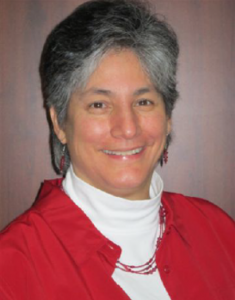 Touro University California (project led by Grace Landel, PA-C, MEd)
Touro University California (project led by Grace Landel, PA-C, MEd)
Grant Amount: $10,000
Project Name: Mental Health Training in Rural Northern California
Project Description: According to a 2018 University of California at San Francisco report, California must make substantial investments in mental health professionals. Data from 2011 to 2015 shows that 62.8% of Californians did not receive mental health services, with the majority of CA patients considered to live in a mental healthcare professional shortage area. As mental healthcare providers reach retirement age, there will be an estimated 50% decrease in psychiatrists and 28% decrease in psychologists/social workers from 2016 to 2028. The Touro University California Joint Master of PA Studies/Master of Public Health (MSPAS/MPH) Program has a commitment to educating PAs to provide healthcare to patients in health professional shortage areas. The program has offered a free one-day continuing medical education (CME) granting conference yearly in Napa, CA, following the California Academy of PAs annual winter conference. Since 2013, it has served 203 PAs, 267 PA students, and 9 non-PA clinicians. The funding for this project was originally through a 2-year California Office of Statewide Health Planning and Development (OSHPD) Mental Health grant. This IMPACT Grant will build on prior successful mental health conferences and bring access to training for rural PAs and other healthcare professionals in northern CA. The conference will thematically focus on destigmization of mental health with lectures in opioid and substance abuse treatment.
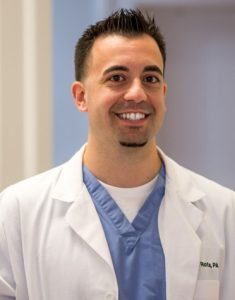 Wagner College PA Program (project led by Michael Rota, PA-C)
Wagner College PA Program (project led by Michael Rota, PA-C)
Grant Amount: $6,297
Project Name: Knowledge is Life-Saving: Changing Adolescents’ Perception of Marijuana Use and Mental Health
Project Description: Drug use and mental health concerns frequently overlap in adolescents. Adolescents often start using drugs as a means of coping with anxiety or depression. Conversely, frequent drug use precipitates mental health issues. Effectively combating adolescent drug use, therefore, requires addressing both drug abuse and mental health problems, often simultaneously. It is the goal of the Wagner College PA Program to create a sustainable adolescent educational program that would not only increase knowledge about mental health, depression, and drug use, but would also change perceptions and behaviors. Project development would involve the commitment of PA faculty and students. PA students will be involved in developing and executing the programs in high school classrooms and health centers throughout Staten Island. PA student utilization is critical in obtaining the project objectives as they are not only relatable to the high school student population, but will also provide a face for another means of seeking help. Traditionally such programs were taught by police officers or teachers. Now students will be shown another outlet in which they may confide—a healthcare provider. PA students will also learn valuable skills in patient education.
2017 Recipients
IMPACT Grant Recipients, Round 2 (Mental Health Focus) – Awarded December 2017
Florida Academy of PAs (submitted by Susan Salahshor PhD, PA-C, DFAAPA, and Amber Danielecki Buzzi, PA-S)
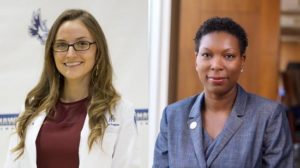 Grant Amount: $10,000
Grant Amount: $10,000
Project Name: Removing the Stigma Associated with Mental Health Through Education
Project Description: The US healthcare system is currently fighting a battle of limited resources and increased demand across all disease fronts. Mental health remains stigmatized and largely ignored by the general population and medical community. Even though one in five Americans experience mental illness we are unequipped to meet their needs. PAs find themselves at the forefront of an ongoing epidemic of untreated and unrecognized illness in both practice and professional relationships. From orthopedics to urology, healthcare providers, regardless of specialty, should be equipped to recognize and properly direct patients with psychiatric illness or crisis to the resources they require. For this reason, the Florida Academy of PAs is beginning an initiative in 2018 to educate the next generation of PAs in Mental Health First Aid. The project would begin by training Florida PA students in the eight-hour Mental Health First Aid training course. Throughout 2018, FAPA President Susan Salahshor and FAPA PA student Amber Danielecki Buzzi will travel to each PA Program throughout the state at no cost for their services.
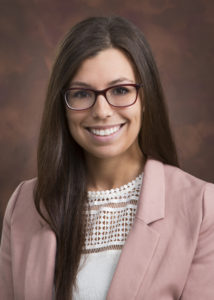 Rush University Community Service Initiatives Program (submitted by Jessica Vlaming, PA-C, Mira Hager, PA-S, and Greg Taycher, PA-S)
Rush University Community Service Initiatives Program (submitted by Jessica Vlaming, PA-C, Mira Hager, PA-S, and Greg Taycher, PA-S)
Grant Amount: $8,630
Project Name: Incarceration Medicine Initiative
Project Description: In 2015, The Atlantic featured an article about Cook County Jail (CCJ) entitled “America’s Largest Mental Hospital is a Jail.” The authors of the article estimated that one in three individuals at CCJ suffer from mental illness, which made CCJ the state’s largest single mental health provider. This demonstrates the burden of mental illness within the correctional setting and the need for corresponding intervention. The Incarceration Medicine Initiative (IMI) is a health education intervention program developed and implemented by an interdisciplinary team of health professional students at Rush University; the curriculum focuses on issues that are particularly salient among the men and women in the jail participating in our program. Given the high rates of mental illness and substance use disorders in correctional settings, we dedicate two of our ten weekly sessions to these topics. These sessions are designed to demystify and destigmatize mental health conditions and substance use disorders by providing a basic overview of what these conditions are, a brief summary of treatment options, and a safe space for questions and discussion on these sensitive topics.
IMPACT Grant Recipients, Round 1 – Awarded May 2017
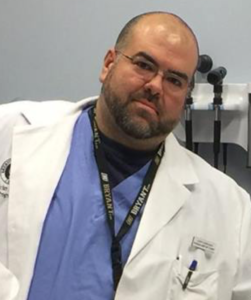 Clínica Esperanza/Hope Clinic (submitted by Joseph Desrosiers II, PA-S, Bryant University PA Program)
Clínica Esperanza/Hope Clinic (submitted by Joseph Desrosiers II, PA-S, Bryant University PA Program)
Grant Amount: $9,797
Project Name: PA Implementation of the Chronic Care Model for Better Diabetes Health Outcomes in an Uninsured, Low Socioeconomic Population
Project Description: The goal of establishing a PA-run diabetes clinic at Clínica Esperanza/Hope Clinic (CEHC) is to implement the six core elements of the American Diabetes Association Critical Care Model. This will be accomplished by utilizing a proactive approach of offering healthcare education, monitoring, treatment, and maintenance to diabetic and pre-diabetic patients in the clinic’s current patient census. The program effort will be combined with ongoing CDC Diabetes Prevention Program initiatives already in place at CEHC. CEHC offers primary medical care to Rhode Island residents without health insurance, with an emphasis on Spanish-speaking and culturally accustomed care. It serves as the primary point of care for a large population of uninsured and largely Spanish-speaking individuals who reside primarily in West and South Providence, RI. Faculty and class leaders will implement a bimonthly PA DM Clinic day at CEHC that will stress a team-based approach to DM care, working in conjunction with clinic staff for the best possible outcomes for this vulnerable patient population.
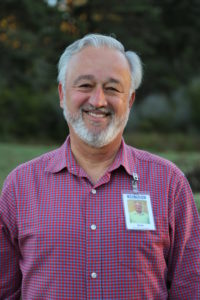 Redwood Coast Medical Services, Inc. (submitted by Harold Ewing, PA-C)
Redwood Coast Medical Services, Inc. (submitted by Harold Ewing, PA-C)
Grant Amount: $9,960
Project Name: RCMS Retinopathy Screening Program
Project Description: Redwood Coast Medical Services (RCMS) is a not-for-profit community health center, established in 1997, and designated as a Federally Qualified Health Center in 1999. RCMS is the sole provider of medical care in a frontier service area located in the isolated coastal region of northern Sonoma and southern Mendocino counties in northern California. Care is delivered by RCMS at three facilities including two medical clinics and one dental clinic located in Gualala and Point Arena. Through this grant, RCMS will have the ability to purchase a retinal camera and provide a new service within the clinic that will enhance the ability to care for diabetic and hypertensive patients. Currently, without a retinal camera onsite, patients are referred out of the area for this screening and have a very low return rate on patients completing the screening. The commute out of the area to get the screening is an average of a 90 minute or more drive one way.
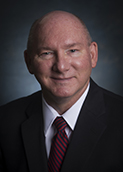 University of Alabama at Birmingham (submitted by Rick Kilgore, PhD, PA-C, DFAAPA)
University of Alabama at Birmingham (submitted by Rick Kilgore, PhD, PA-C, DFAAPA)
Grant Amount: $5,349.40
Project Name: Firehouse Shelter Wellness Wednesday Student-Led Screening Clinic
Project Description: The UAB Physician Assistant Studies Program has collaborated for the past ten months with a local established shelter for homeless men in the Birmingham metropolitan area, which has a goal of improving the health and education of these individuals. This is being done through a student-led clinic of PA students who are assisted by students from the disciplines of clinical laboratory science, health care administration, dietitians, occupational and physical therapy, mental health, pastoral care, nursing and faculty from the University of Alabama at Birmingham School of Health Professions. There will be several components to the student-led clinic including healthcare screening, health and nutritional education, and treatment referral.
2016 Recipients
IMPACT Grant Recipients, Round 2 (Mental Health Focus) – Awarded December 2016
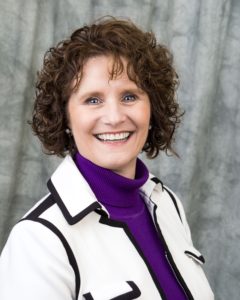 A.T. Still University (submitted by Michelle DiBaise, PA-C)
A.T. Still University (submitted by Michelle DiBaise, PA-C)
Grant Amount: $4,781
Project Name: Meeting at the Crossroads to Improve Care Coordination Competency and Readiness for Transition to Integrated Practice
Project Description: Care coordination teams comprised of PA and other health professions students, under the supervision of licensed healthcare clinician faculty, will coordinate screening and referral of Crossroads residents to the AICBEP-funded weekly multi-specialty clinics, psychiatric nurse practitioner, or other on-site providers as needed. Further, PA students will both observe and participate in the evaluation and management of referred patients in conjunction with on-site healthcare providers. Finally, supervised PA students will continue to provide intake health assessments, screen for mental and other illness, identify the need for counseling, vocational or educational services, and create referrals to the care coordination team as appropriate. IMPACT Grant support will allow PA students to additionally provide smoking cessation medications and education at intake, followed by recurring student-led support meetings on-site. These efforts will provide no-cost, integrated, holistic support for mental and physical health on-site to patients with substance abuse disorder, reducing the flight risk associated with off-site referrals and ensuring continuity of care.
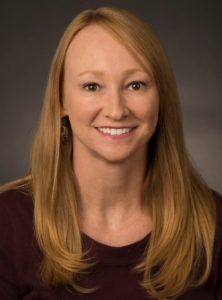 Idaho State University (submitted by Jennifer Forbes, PA-C)
Idaho State University (submitted by Jennifer Forbes, PA-C)
Co-investigators: Jared Papa and Talia Sierra
Grant Amount: $1,528.14
Project Name: Improving Mental Health in Idaho Through Community Based Screenings and Patient Education
Project Description: PA faculty and students at Idaho State University participate in multiple interdisciplinary community health screenings in the Boise, ID, area. These screenings provide great services to individuals in the community, but could be enhanced by expanding the mental health component of the screenings. Through funding from the IMPACT Grant, the mental health component of these community-based screenings will be enhanced by adding new screening tools for depression and alcohol use as well as implementing a mental health curriculum that will be used to educate patients on mental health disorders and provide local resources for assessment and treatment of mental health disorders. The goals of integrating mental health education into these patient-focused events are to improve patient outcomes by educating individuals on mental health principles. By having a better understanding of mental health, the stigma associated with mental health disorders should be reduced.
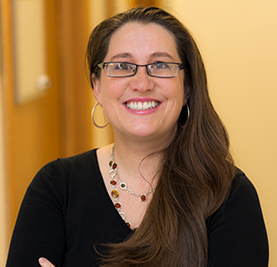 Weber-Morgan Health Department (submitted by Lisa Stephens, PA-C)
Weber-Morgan Health Department (submitted by Lisa Stephens, PA-C)
Grant Amount: $3,690
Project Name: One Good Thing
Project Description: “One Good Thing” will be implemented in one PA’s practice to address depression and self image in adolescents. It is a series of visits aimed at increasing self-esteem, confidence, and therefore self efficacy through a multifaceted approach.
IMPACT Grant Recipients, Round 1 – Awarded May 2016
Jackson Free Clinic (submitted by Meagan McKinnon, PA-S, Shauna Nguyen, PA-S, and Joseph Kotnour, PA-S)
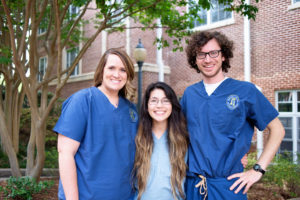 Grant Amount: $4,847
Grant Amount: $4,847
Project Name: Improving Mississippi through Physician Assistant Community Teaching (IMPACT)
Project Description: Students from Mississippi College’s Physician Assistant Program have been given the opportunity to join the medical teams at Jackson Free Clinic in Jackson, Mississippi in the treatment and evaluation of patients. The Jackson Free Clinic is a non-profit organization whose mission is to provide quality care to the underserved, indigent and homeless populations in the Jackson Metro Area. Due to a lack of structured programming and adequate funding, Jackson Free Clinic is seeking to improve in the area of patient education and will be using physician assistant students to achieve this aim. PA students will assume the patient education leadership role at Jackson Free Clinic by engaging with patients at the clinic and educating them in the areas of diabetes, hypertension, and obesity through interactive educational modules. Through the use of technology and tangible health models, the PA students seek to maximize the patient’s time in clinic and provide them with relevant, useful tools for making lifestyle modifications that could improve their overall health outcomes.
Rush University (submitted by Jessica Vlaming, PA-C, Vic Speedwell, PA-S, and Juli Dziuban, PA-S)
 Grant Amount: $8,567.16
Grant Amount: $8,567.16
Project Name: Incarceration Medicine Initiative
Project Description: The Incarceration Medicine Initiative is an interprofessional volunteer organization that will provide a health education curriculum to male and female inmates at the Cook County Jail, by engaging inmates in weekly lecture and discussion of common health issues and topics. The Cook County Jail is one of the largest correctional facilities in the United States, and the population of inmates disproportionately comes from low socioeconomic areas of Chicago that face a lack of quality education opportunities, lack of health care access, and for many, racial discrimination.
Touro University California (submitted by Joy Dugan, PA-C)
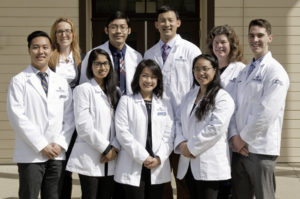 Grant Amount: $1,000
Grant Amount: $1,000
Project Name: Student Run Free Clinic (SRFC) Expansion Project
Project Description: The SRFC provides free health screening and a variety of services to the residents of Vallejo. PAs currently perform H&P, vitals, and screenings. What we would like to add to our clinic are smoking cessation, immunization training, and health awareness education. PAs would be trained in educating patients on management of a variety of chronic conditions and smoking cessation. They would also assist in managing the effectiveness and success of the patient’s smoking cessation. For immunizations, PAs would be trained earlier in the year to give immunizations at a more applicable time during flu season.
 Wayne State University (submitted by Lindsay Gietzen, PA-C)
Wayne State University (submitted by Lindsay Gietzen, PA-C)
Grant Amount: $4,450
Project Name: Special Olympics Health Appraisals
Project Description: The purpose of the PA Foundation IMPACT Grant for Special Olympics Health Appraisals is to increase availability and supplies for Special Olympics appraisals and to increase PA student exposure and involvement with intellectually impaired populations. One stipulation to Special Olympics participation is a health appraisal that must be completed by a medical provider.
2015 Recipients
IMPACT Grant Recipients, Round 3 – Awarded January 2016
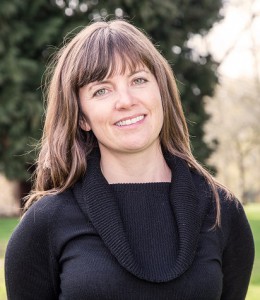 Kari Bernard, PA-C, Alaska Health Fair Inc.
Kari Bernard, PA-C, Alaska Health Fair Inc.
Grant Amount: $2,500
Project Name: Hosting a Health Fair for a Homeless Population in Alaska
Project Description: The University of Washington PA students chosen to matriculate into the Anchorage class each have a strong connection to the state of Alaska, and most have plans to remain in state to practice. Built into the didactic curriculum is exposure to underserved Alaskan populations, most notably those without adequate housing who are at great risk for poor health outcomes. Every winter, the didactic class partners with Brother Francis Shelter and Alaska Health Fair Inc to host a health fair for the homeless. PA students provide education aimed at maintaining health on the streets. A hematology and chemistry lab panel is also drawn on fair participants and when the results are back, volunteers at the shelter-based clinic help patients interpret the results and assist with referral to providers as needed.
 Tara Rick, PA-C, Master of PA Studies Program at St. Catherine University
Tara Rick, PA-C, Master of PA Studies Program at St. Catherine University
Grant Amount: $3,700
Project Name: “See and Treat” Cervical Cancer Screening and Treatment in Tanzania
Project Description: A great majority of cervical cancer deaths in the world occur in developing countries. Due to a lack of cost effective screening, women present with advanced stage disease with little chance of cure. The “See and Treat” cervical cancer screening and treatment of precancerous lesions using cryotherapy is effective in low-income countries. Selian Hospital in Arusha, Tanzania, serves a community of >700,000 and has no financial capability for cryotherapy. This project involves providing a local gynecologist with the sustainable cryotherapy system and sponsoring his participation in a U.S.-based cryotherapy training session in Tanzania in June 2016; the gynecologist would then train local healthcare providers (PA similar) to screen for cervical cancer. A PA and PA students from the U.S. would also participate in the training session. The project will provide Tanzanian women with immediate access to life saving treatment against the number one cancer killer in Tanzania.
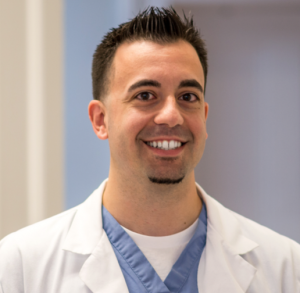 Michael Rota, PA-C, Wagner College PA Program
Michael Rota, PA-C, Wagner College PA Program
Grant Amount: $9,200
Project Name: Traditional Birthing Attendant (TBA) Training Campaign
Project Description: The purpose of this project is to implement an educational program for traditional birth attendants (TBAs) and indigenous women led by a cohort of PA faculty and students volunteering for an upcoming medical mission trip to Guatemala. The group will visit remote mountain communities to offer interactive, culturally-sensitive, simulation-based educational programs to local indigenous women and ‘comadronas’ (traditionally-trained birth attendants) with the goal of improving birthing practices. With the help of models and manikins, PA faculty and students will demonstrate procedures and techniques that can improve maternal and infant outcomes. In addition to the educational sessions, participants with receive a birthing kit that includes educational materials along with items needed for a delivery under sterile conditions.
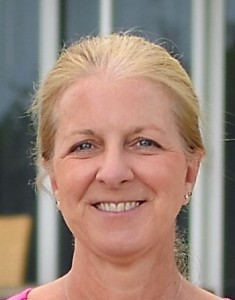 Kathleen Scarbalis, PA-C, Pediatric Specialists of Virginia
Kathleen Scarbalis, PA-C, Pediatric Specialists of Virginia
Grant Amount: $900
Project Name: Physical Activity Initiative in Pediatric Acute Lymphoblastic Leukemia Patients
Project Description: Families are overwhelmed when informed of a childhood cancer diagnosis. This project is focused on improving patient health outcomes and education for this patient population. The overall survival for childhood leukemia is approaching 95%, but the late effects from the treatment can be lingering. Families need encouragement to realize their leukemia child can maintain safe activities during chemotherapy treatments. A team of PAs working with a physical therapist over the past 7 years noted a decrease in activity level for patients on active treatment and the resulting issues, such as decreased stamina, obesity, and muscle weakness in leukemia survivors. This feasibility study will involve evaluating a physical activity program for active leukemia patients. Once there is sufficient data, the goal is to publish the information and make other pediatric cancer centers aware of the possibilities of early intervention for improved health outcomes with improved patient education.
IMPACT Grant Recipients, Round 2 – Awarded October 2015
The following PAs and PA students were awarded the second round of IMPACT grants for community-based programs that foster innovation and improve health.
Keith Byrd, PA-S, University of California-Davis
Grant Amount: $10,000
Project Name: Project ADAPTS: Action on Diabetes Awareness and Periodontal Treatment in Sacramento
Project Description: The main goal of project ADAPTS is to improve access to diabetes education and oral health services in these underserved communities through a network of student- run clinics. In this student/community partnership, we propose an innovative approach to health education that will be inter-professional, patient-centered, culturally sensitive and sustainable. This project is novel and feasible in this region and can be replicated in other student-run clinics in America.
Adriana Paredes, PA-C, Good Shepherd Ministries of Oklahoma
Grant Amount: $5,000
Project Name: Newly Diagnosed A1c Medicine and Supplies
Project Description: This grant’s target population is uninsured, newly diagnosed diabetic patients in the Oklahoma City metro area with limited, if any, personal funds to spend on supplies and medication to control their disease. Currently, Good Shepherd serves approximately 400 uninsured diabetic patients in the Oklahoma City metropolitan area. The Physician Assistant Foundation’s IMPACT Grant will be used to pay for glucometers, testing supplies and oral hypoglycemic diabetic medication currently provided in-house for our patients. Presently, these supplies and medications are purchased by the Pharmacy Program Coordinator out of funds designated from a previous grant, which will deplete by the end of the calendar year 2016. Once depleted, Good Shepherd will no longer be able to provide these critical medications to its patients. These medications are not otherwise available to patients through a Drug Assistance Program.
Barbara Medina-Palacios, PA-C, Stephens Memorial Hospital
Grant Amount: $5,000
Project Name: Stephens Memorial Hospital Diabetes Education Program
Project Description: As diabetes becomes more prevalent in our society, the residents of rural communities feel the burden of not only a shortage of medical providers, but also access to medical care such as clinics, hospitals, etc., and access to educational programs, prevention services, and screening opportunities. Therefore, Stephens Memorial Hospital’s Rural Health Clinic, Breckenridge Medical Center, has recently formed a diabetes education program that will serve the residents of Stephens County, population 9500. This program will be used to: 1. Provide education to the community on prevention; 2. Be a conduit for screening services; 3. Provide monthly educational programs and support to participants; 4. Provide medical oversight and management with MD and DO supervision of physician assistant; 5. Offer group activities such as cooking demonstrations, recipe “overhaul,” and exercise classes; and 6. Provide social and emotional support.
IMPACT Grant Recipients, Round 1 – Awarded AAPA Conference 2015
The following PAs and PA Student were awarded the first round of IMPACT Grants for community-based programs that foster innovation and improve health.

Tameem H. Sabry, PA Student, Touro University Nevada
Grant Amount: $10,000
Project: Touro Nevada Mobile Healthcare Clinic Program
Project Description: Touro University Nevada began a service-learning course in 2010. The goal of the course is to develop civic responsibility among the physician assistant students. During the service-learning course, a cohort of students is assigned to a community partner over a four month period. Through communication and negotiation skills, the students identify a problem the community partner may have and develop a solution that would be meaningful to both the partner and students. The solution must be viable after the students leave.
An outcome of this course is the Touro Mobile Healthcare Clinic. The students realized that many homeless were not getting urgent medical care because of their fears and reluctance in leaving the patch of ground they have called “theirs.” To address this, the Touro Mobile Healthcare Clinic was conceived and after four years of hard work and negotiations, put into action.
However, it was discovered that the types of patients the clinic was caring for was not anticipated. While the clinic is equipped to handle simple urgent problems, there are a number of patients that present with more chronic and complex needs. In order to address this, different equipment and supplies are needed; an expense that the clinic has not anticipated in its budget.

Ruth G. Dotson, PA-C, High Country Community Health
Grant Amount: $5,000
Project: High Country Community Health Hepatitis C Clinic
Project Description: The purpose of this application is to seek funds to identify and promote treatment of underserved patients in our community with chronic hepatitis C. We seek funding for screening, associated lab costs, and hepatitis A and B immunization. Chronic hepatitis C virus (HCV) is the leading cause of liver transplantation and liver cancer in the US and the second leading cause of cirrhosis. It is estimated that over 150,000 North Carolinians are infected with HCV, with prevalence of approximately 2%. There are approximately 1500 people infected with the virus in rural northwest North Carolina (also known as the High Country). In the past treatment of HCV has involved minimally 24-48 weeks of therapy with significant side-effects and clearance rates of only approximately 50-60%. New therapies offer exceptional promise with treatment of only 8-24 weeks and cure rates approaching 98% with minimal side-effects. However, many patients with HCV are low-income and uninsured, limiting access to treatment and immunization against hepatitis A and B. Also, approximately half of patients with HCV are unaware they have the disease.
High Country Community Health (HCCH) is a Federally Qualified Health Center with clinics in Watauga and Avery Counties, NC. Established in 2012, HCCH offers comprehensive and culturally sensitive services to medically underserved populations in the surrounding rural communities. There is great need for identification and treatment of those with HCV in our community, and with your help all persons with HCV in the High Country can have a chance for a cure.
Interested in IMPACT Grants? Learn More.
